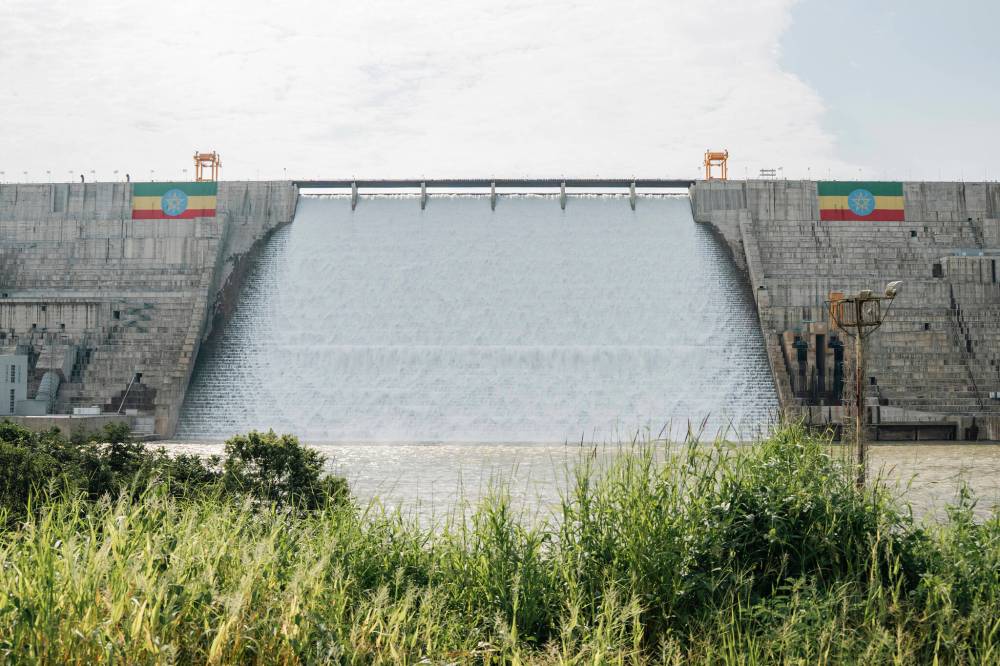Ethiopia’s new mega dam stokes regional tensions
Advertisement
Read this article for free:
or
Already have an account? Log in here »
To continue reading, please subscribe:
Monthly Digital Subscription
$0 for the first 4 weeks*
- Enjoy unlimited reading on winnipegfreepress.com
- Read the E-Edition, our digital replica newspaper
- Access News Break, our award-winning app
- Play interactive puzzles
*No charge for 4 weeks then price increases to the regular rate of $19.00 plus GST every four weeks. Offer available to new and qualified returning subscribers only. Cancel any time.
Monthly Digital Subscription
$4.75/week*
- Enjoy unlimited reading on winnipegfreepress.com
- Read the E-Edition, our digital replica newspaper
- Access News Break, our award-winning app
- Play interactive puzzles
*Billed as $19 plus GST every four weeks. Cancel any time.
To continue reading, please subscribe:
Add Free Press access to your Brandon Sun subscription for only an additional
$1 for the first 4 weeks*
*Your next subscription payment will increase by $1.00 and you will be charged $16.99 plus GST for four weeks. After four weeks, your payment will increase to $23.99 plus GST every four weeks.
Read unlimited articles for free today:
or
Already have an account? Log in here »
After 14 years of construction, the Grand Ethiopian Renaissance Dam (GERD) was finally inaugurated on Sept. 9. It’s now Africa’s largest source of hydroelectricity. Located upstream on the Nile River, the US$5-billion facility also epitomizes a successful nation-building project. Funding for it was crowdsourced domestically via special-purpose government bonds bought by everyday citizens.
However, even before it started producing power, the mega dam was generating animosity among neighbouring countries in a region on edge.
The GERD has the potential to double Ethiopia’s electricity generation capacity when running at full throttle. That’s thanks to over 85 per cent of Nile River waters originating in the landlocked country’s highlands.

AP Photo
A view of the Grand Ethiopian Renaissance Dam in Benishangul-Gumuz, Ethiopia, Sept. 9.
Accompanied by a buildout of the power grid to rural areas, some 60 million more residents could soon newly light their homes. Key industries in Africa’s second most populous nation such as manufacturing, textiles, mining and agriculture will also see benefits. A deluge of foreign investment may soon follow.
Ethiopia’s government seeks to become an influential energy provider as well. The GERD — semi-operational since 2022 — generated a reported US$427 million this year in energy sales to customers in Djibouti, Kenya and Tanzania.
“This project means the end of Ethiopia’s geopolitical insignificance,” Prime Minister Abiy Ahmed Ali said at the inauguration ceremony earlier this month. That’s likely true — but it also portends scenarios that aren’t entirely positive.
Egypt and Sudan sit on the Nile downstream from Ethiopia and rely on the river for the vast majority of their fresh water. For nearly a century, they have enjoyed privileged water rights safeguarded by colonial-era treaties first signed with the British Empire.
But to accommodate GERD coming online, several countries in the Nile River Basin including Ethiopia last year signed an updated regional water-sharing framework. The deal was rejected by both Cairo and Khartoum.
When Ethiopia began filling the GERD in 2021, Egypt’s strongman leader threatened military action if Nile flows were impeded. “Let’s not reach the point where you touch a drop of Egypt’s water, because all options are open,” warned Egypt’s President Abdel Fattah el-Sisi at the time.
Egypt — an extremely arid country with a population of 116 million — depends on the Nile for 93 per cent of its annual freshwater supply. In a letter to the UN Security Council in early September, Egypt’s foreign minister warned against “misguided assumptions” that Cairo wouldn’t aggressively defend “the existential interests of its people.”
Sudan, meanwhile, has previously accused Ethiopia of building GERD as a unilateral means to control the Nile. And yet Sudan’s central government — or at least what remains of it — has so far stayed mum since Ethiopia’s mega dam became fully operational.
This underscores the massive leadership void in Sudan. For the past two-plus years, the nation has been engulfed in ruinous civil war. Any disruptions to Sudan’s water supplies — or sudden increase in water flows down the Nile, causing flash floods — could aggravate what is already the world’s worst humanitarian crises.
“Sudan faces very real risks because they’re immediately downstream of the dam,” a researcher at the University of Oxford’s Environmental Change Institute recently told German media outlet Deutsche Welle. “Day-to-day co-ordination is the main issue,” he said, given how Ethiopia releasing too much or too little water at a time will have an outsized impact on the reliability and volume of Sudan’s water supply.
Taken altogether, the GERD appears it may be both a blessing and a curse to the region.
On the one hand, it is a huge new source of renewable energy in a fragile part of the world beset by development challenges. On the other hand, layering another serious diplomatic dispute and potential military action on top of the neglected conflicts that already exist nearby is a bleak prospect.
In addition to Sudan’s spiral into the abyss, Somalia also needs much more security support. It’s busy battling sophisticated jihadist terror groups affiliated with both al-Qaeda and the Islamic State, which have built-up ties with Houthi rebels in Yemen. This includes sharing lethal drone technology.
Egypt, meanwhile, is struggling to limit the fallout of mass displacement close to its northern border with Gaza due to Israel reducing the Palestinian territory to ashes.
Ethiopia itself, too, is just barely recovering from its own devastating civil war in Tigray. The conflict formally ended in late 2022 but heated rivalries between heavily armed ethnic militias remain a feature of the nation’s political landscape.
Ultimately, GERD could be a source for good — or another reason for division in a troubled neighborhood. Regional leaders must decide.
Kyle Hiebert is a Montreal-based political risk analyst and former deputy editor of the Africa Conflict Monitor.

